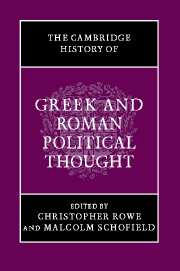Book contents
- Frontmatter
- Introduction
- PART I ARCHAIC AND CLASSICAL GREECE
- 1 Greek political thought: the historical context
- THE BEGINNINGS
- 2 Poets, lawgivers, and the beginnings of political reflection in archaic Greece
- 3 Greek drama and political theory
- 4 Herodotus, Thucydides and the sophists
- 5 Democritus
- 6 The Orators
- 7 Xenophon and Isocrates
- 8 Socrates and Plato: an introduction
- 9 Socrates
- 10 Approaching the Republic
- 11 The Politicus and other dialogues
- 12 The Laws
- 13 Plato and practical politics
- 14 Cleitophon and Minos
- ARISTOTLE
- PART II THE HELLENISTIC AND ROMAN WORLDS
- Epilogue
- Bibliographies
- Index
- Map 1. Greece in the fifth century bc"
- References
11 - The Politicus and other dialogues
from THE BEGINNINGS
Published online by Cambridge University Press: 28 March 2008
- Frontmatter
- Introduction
- PART I ARCHAIC AND CLASSICAL GREECE
- 1 Greek political thought: the historical context
- THE BEGINNINGS
- 2 Poets, lawgivers, and the beginnings of political reflection in archaic Greece
- 3 Greek drama and political theory
- 4 Herodotus, Thucydides and the sophists
- 5 Democritus
- 6 The Orators
- 7 Xenophon and Isocrates
- 8 Socrates and Plato: an introduction
- 9 Socrates
- 10 Approaching the Republic
- 11 The Politicus and other dialogues
- 12 The Laws
- 13 Plato and practical politics
- 14 Cleitophon and Minos
- ARISTOTLE
- PART II THE HELLENISTIC AND ROMAN WORLDS
- Epilogue
- Bibliographies
- Index
- Map 1. Greece in the fifth century bc"
- References
Summary
As a political work, the Politicus is generally regarded as a poor relation of the Republic and the Laws: on the standard view, it reflects rather scrappily on issues arising out of the Republic (especially in relation to the idea of philosopher rulers), and somehow prepares the way for the Laws. But such an approach fails to do justice to its argument. Once its twists and turns are properly understood, it stands out as a major document of Platonic political theory in its own right; less bulky though it may be than either of the other two works, and certainly less appealing than the Republic, it offers real illumination of some central themes, and adds some important new elements which are not in any way superseded in the Laws.
The first, and perhaps chief, problem for the interpreter is to understand the structure of the argument, and its outcome or outcomes. The dialogue has four main components: a long series of ‘divisions’ aimed at defining the politikos, the ‘politician’ or (more traditionally) the ‘statesman’, together with his ‘art’ or expertise (‘statesmanship’); a cosmological myth, inserted into the divisions at an early stage, which allegedly helps take them forward; a discussion of the role of law in ideal and actual societies, which similarly interrupts the process of division, though it is formally motivated by it; and, after the divisions have been completed, a description of the role of the statesman in ‘weaving together’ complementary character traits or kinds of temperament among the citizens.
- Type
- Chapter
- Information
- The Cambridge History of Greek and Roman Political Thought , pp. 233 - 257Publisher: Cambridge University PressPrint publication year: 2000
References
- 7
- Cited by

